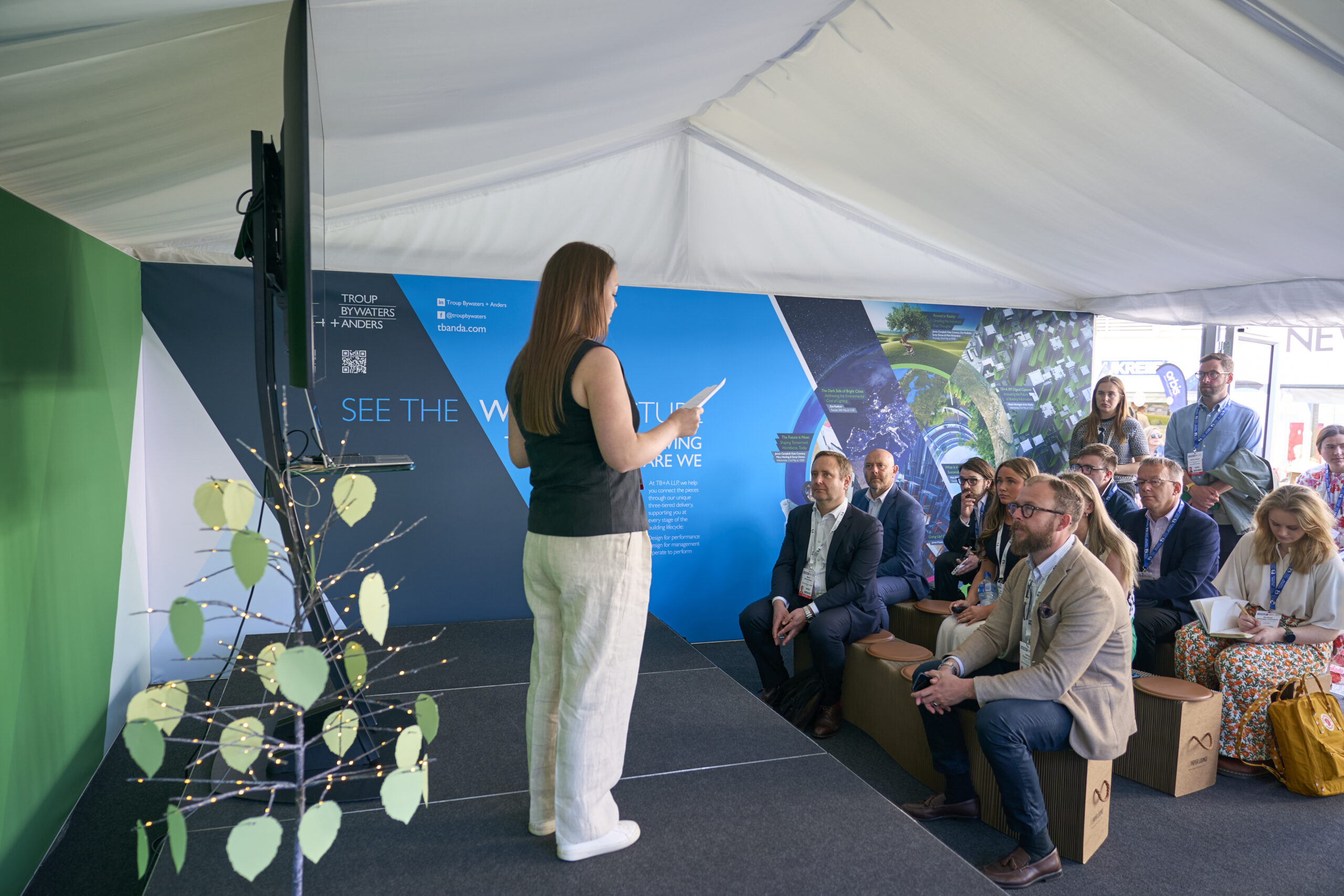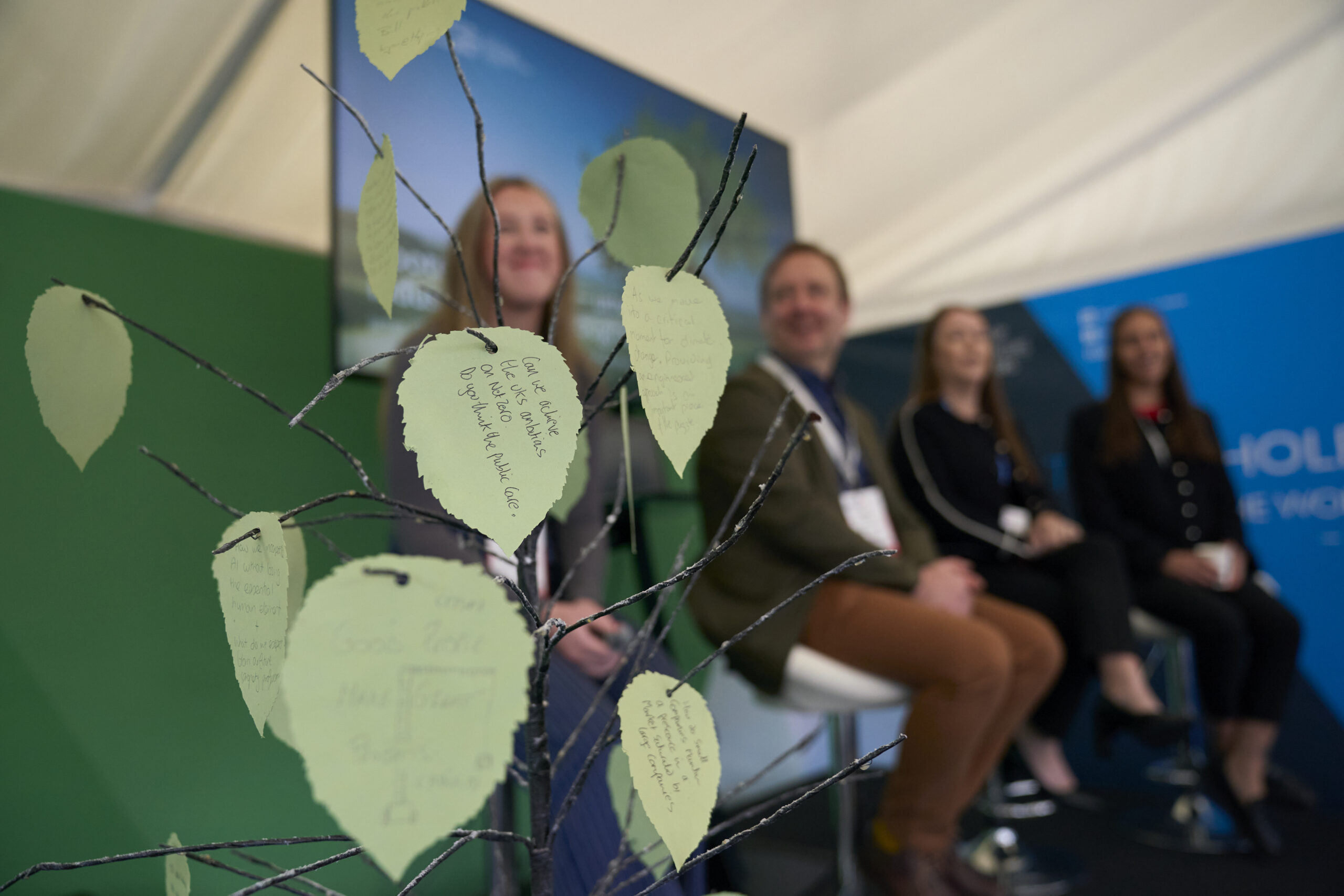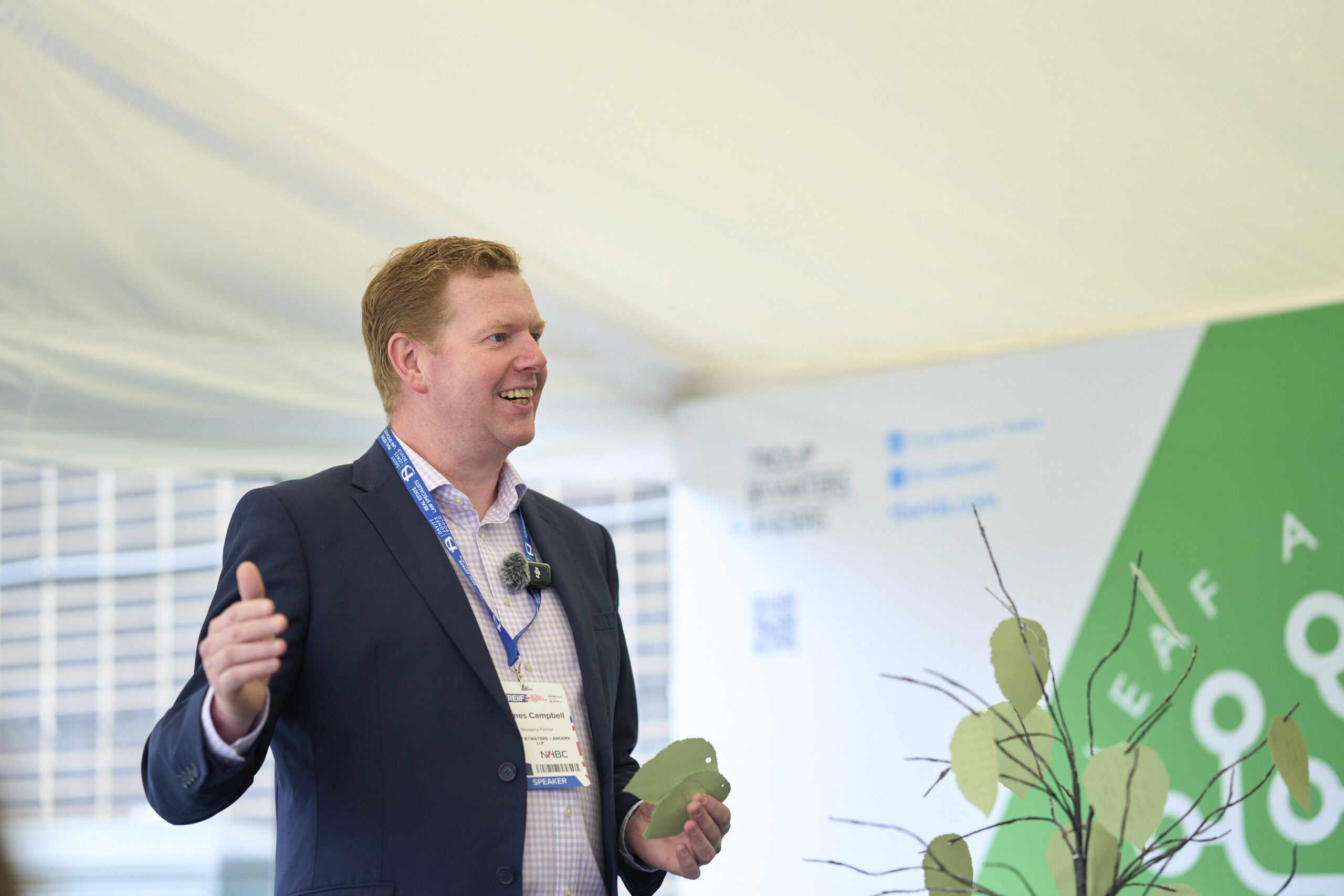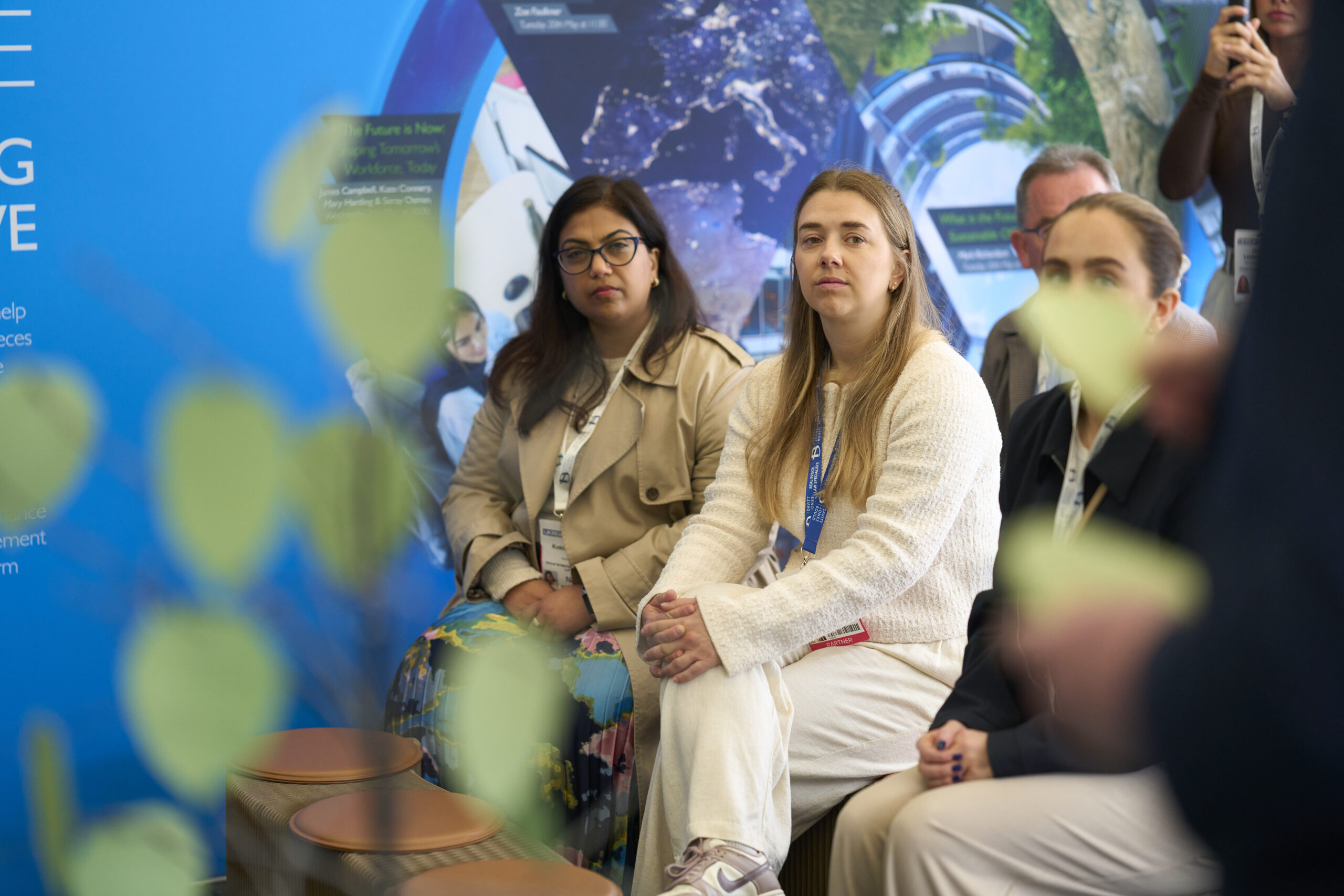At this year’s UKREiiF, our Pavilion became a space for reflection and conversation. As visitors were welcomed, we invited them to write down a thought, question, or challenge facing the built environment, each one captured on a leaf and added to our ‘Thought Tree’. These weren’t just discussion prompts, they were the industry's authentic voices, offering insight into what really matters to those shaping our sector today and for the future.
To explore these thoughts further, our Managing Partner, James Campbell chaired a live discussion featuring panellists from TB+A - Kate Connery, Building Services Design Engineer Apprentice, Mark Richardson, Partner of Sustainable Innovation, Zoe Faulkner, Partner of our Architectural Lighting team, and Seray Osman, Sustainability Consultant. Together, they unpacked the thoughts and themes left by our visitors and shared their views on how we move forward together, as an industry.
The people behind the projects
James began by pulling the first leaf, “Good people make great projects.” It sparked a conversation around how a people-first approach can make all the difference and is what sets strong teams apart.
Kate, who joined TB+A through our apprenticeship scheme reflected on how vital support is to nurturing good people. “There are so many people around our offices that are supporting us, whether you're in London or Belfast, even though a lot is over Teams now, you always feel like you're supported” she said.
Seray agreed, noting that while Teams helps bridge distance, the partnership still values face-to-face connection. “There are plenty of opportunities to meet in person...collaboration is key.”

Zoe added that creativity is at the core of what drives great work. “Every project is different and I think every project brings new challenges but also drives new designs that can really inspire.”
Mark offered a broader perspective, linking people with purpose. “We hear phrases such as ‘battle for talent’ but I’d say the real battle is climate change, it’s the fight of our generation. We need to pull the best people into this industry and make it a purpose-driven place to work.”
Collaboration that works
Our next leaf focused on “developing key partnerships across disciplines”, which led the panel to explore the importance of relationship building and collaboration in delivering successful, future-ready projects.
Zoe shared her experience learning from peers within the Partnership from an Architectural Lighting perspective, “It’s fundamental that we’re part of an MEP consultancy, we learn from our engineers and they learn from us. Every month, we share our lessons learned with the wider partnership and I believe this is the key to growing our projects.”
Mark zoomed out to the macro-level challenge of transitioning to a circular economy, where partnership is non-negotiable. “No one person or team can drive this alone. It’s a global movement and we need bold objectives backed by real collaboration.”

The cost of innovation
Another leaf posed a more challenging question “We do have to spend money to be innovative, how much is that going to cost?”. This resonated strongly, especially given the ambitious net zero targets many clients are working towards. There’s still a belief in some corners that these goals can be met without significant change, but the panel made it clear, real progress requires investment. Innovation isn’t just a “nice-to-have, it’s essential” and the cost is part of the commitment to doing things differently for long-term value.
Mark didn’t shy away from the complexity of the answer. “Yes, there’s hard cash on one side but there’s long-term risk on the other. ESG is a tool to mitigate long-term asset risk. We need to bring clients and investors on this journey with us.”
Seray pointed out that “the innovative sustainable solutions right now are more expensive than ‘business as usual’, and that’s a barrier but it will shift over time.”
Is net zero achievable and do people really care?
“Can we achieve the UK’s net zero goals? And do the public really care?” was another thought left by one of our Pavilion visitors.
Seray felt that although net zero is now a widely used term, it’s often misunderstood. “It’s definitely a buzzword but not everyone really grasps its true meaning. The recent launch of the UK Net Zero Carbon Building Standard is a positive step but there’s still a long way to go.”
Mark responded directly to the question of public interest. “The emerging generation certainly care; I’ve seen it first-hand in apprenticeship interviews. Young people want purpose-driven careers and they’re highly motivated. We need to honour that by leading with sense and science, not political bias.”
Kate, currently in her second year of an apprenticeship added, “Someone once joked ‘you deserve the world we leave you’ but that stuck with me. There’s a real awareness now and I can see that in how people talk about sustainability and in what we’re learning at university.”
Who’s leading the charge on sustainability?
On the question of leadership, James asked “Who do you think will be leading the charge as we move forward?”
“At TB+A, we believe in an engineered approach to net zero” Mark says, “that means not just ideas, but practical outcomes. Our whole life approach means we think beyond design - we think about how that building will actually operate.”
Zoe agreed that “We are in the driving seat”, but creativity is where we can really bring the most value. “We have to come with smart, innovative ideas, especially in areas like lighting where standards such as WELL and BREEAM are having a big impact.”
The role of smaller businesses

With increasing mergers and acquisitions, James asked whether the changing market landscape would impact project delivery and what role smaller organisations would play.
Mark observed, “Compared to the big global players, we’re relatively small but that’s not a bad thing, we bring a very specific angle. We have 65 years of history building a brand around achieving quality and consistency, growing people and sustainability, it’s that focus and dedication that clients value.”
Zoe felt our tailored approach makes a real difference. “Every scheme is unique. We really care about what the client wants and how we can best achieve it.”
Reflecting on how being part of a smaller, people-focused practice means direct access to senior people, more tailored support and an environment where individual development is prioritised. Seray added a more personal take, “It feels like a community. You’re not just a number.”
What about AI?
Of course, no modern discussion would be complete without touching on AI. The final leaf we chose to discuss read, “How should we utilise AI, and what will that mean for skills and diversity?”.
Mark framed it simply, “AI is just another tool, it can free up time to focus on other tasks. That’s what tools are for.”
Zoe, however, noted that AI hasn’t yet made a big impact on her area. “Our lighting designs are individual we collaborate, we brainstorm ideas. AI can’t replace that kind of creative thinking that matches our Clients vision.”
Seray agreed that AI should be seen as an aid, not a shortcut. “It’s not there to write your report for you. It should sit alongside your work, not replace your thinking.”
As the session drew to a close, James asked the panel to reflect on their key takeaways from UKREiiF 2025.
Kate, attending for the first time, said, “It’s been great to speak to people from across the industry and see how interested they are in what we’re learning as apprentices.”
Mark felt encouraged by the energy across the event. “There have been so many good conversations. People are starting to want deeper technical solutions, I think we’re approaching a time that’s going to be good for engineering and good for engineered solutions.”
Zoe described the event as “incredibly inspiring”, and Seray highlighted the buzz around circular economy and biodiversity net gain as key emerging themes. “It’s been amazing to meet people you don’t get to see in day-to-day work. That connection really matters.”
From early career voices to experienced leaders, the underlying message was clear - progress comes when purpose, collaboration, and creativity align.

UKREiiF offered a space to listen, learn, and lean into challenging but necessary conversations. We’re proud to be part of that dialogue, not just through words but through the work we deliver, the values we embed, and the people we continue to invest in.